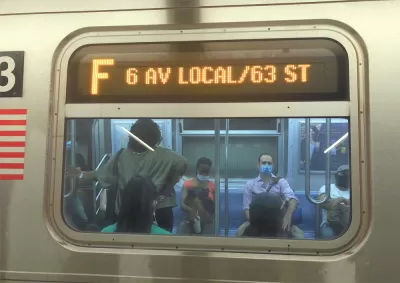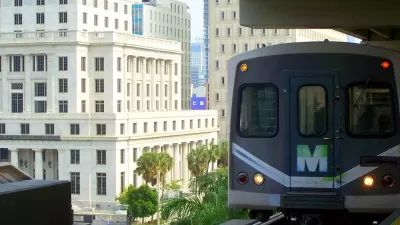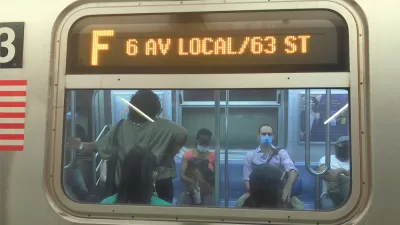The federal funding for public transit systems created by the CARES Act followed the normal federal funding formulas, which don't adequately respond to the realities of the pandemic, according to TransitCenter.

An article by TransitCenter details the growing risk that the pandemic's ongoing effects on transit ridership in the United States will have a long-term effect on transit systems.
The longer the COVID-19 pandemic grinds on, the more the inadequacy of the CARES Act and the old funding formulas it’s based on becomes apparent. As CARES funding is depleted, millions of Americans face the prospect of being unable to reach work, school, medical care, and other daily necessities because transit agencies will be forced to cut service and raise fares. Black, brown, and low-income workers use transit the most, and they will be hardest hit in any austerity scenario.
Transit systems in New York, San Francisco, Denver, and Seattle are threatening (also documented by Planetizen) deep cuts to transit service if they don't receive more emergency funding from the federal government, according to TransitCenter.
The inadequacies of CARES Act funding for transit are multiple, according to the report, and any new federal emergency funding should correct previous mistakes. "Instead of a disaster relief model, targeting assistance according to the specific impacts in affected areas, the CARES Act response to transit was grounded in outmoded equations." The result of the CARES Act funding model, according to the report, is that funding will run out for larger areas in half the time.
FULL STORY: The CARES Act Came Up Short, Now Transit Agencies Are Running Out of Time

Planetizen Federal Action Tracker
A weekly monitor of how Trump’s orders and actions are impacting planners and planning in America.

Maui's Vacation Rental Debate Turns Ugly
Verbal attacks, misinformation campaigns and fistfights plague a high-stakes debate to convert thousands of vacation rentals into long-term housing.

Restaurant Patios Were a Pandemic Win — Why Were They so Hard to Keep?
Social distancing requirements and changes in travel patterns prompted cities to pilot new uses for street and sidewalk space. Then it got complicated.

In California Battle of Housing vs. Environment, Housing Just Won
A new state law significantly limits the power of CEQA, an environmental review law that served as a powerful tool for blocking new development.

Boulder Eliminates Parking Minimums Citywide
Officials estimate the cost of building a single underground parking space at up to $100,000.

Orange County, Florida Adopts Largest US “Sprawl Repair” Code
The ‘Orange Code’ seeks to rectify decades of sprawl-inducing, car-oriented development.
Urban Design for Planners 1: Software Tools
This six-course series explores essential urban design concepts using open source software and equips planners with the tools they need to participate fully in the urban design process.
Planning for Universal Design
Learn the tools for implementing Universal Design in planning regulations.
Heyer Gruel & Associates PA
JM Goldson LLC
Custer County Colorado
City of Camden Redevelopment Agency
City of Astoria
Transportation Research & Education Center (TREC) at Portland State University
Jefferson Parish Government
Camden Redevelopment Agency
City of Claremont





























